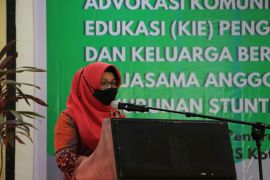"This is the first time that we surveyed the cases and the results are baffling," Thoman Pardosi, the head of social resistance statistics of the National Bureau of Statistics, said.Jakarta (ANTARA News) - Domestic violence cases have risen alarmingly in Indonesia and require serious remedial attention from the government.
"This is the first time that we surveyed the cases and the results are baffling," Thoman Pardosi, the head of social resistance statistics of the National Bureau of Statistics, said on Monday at the bureaus office in Jakarta.
On a national scale, the rate of domestic abuse experienced by women is above 40 percent, in terms of five violence criteria defined by the Ministry of Woman Empowerment and Child Protection, he said.
The first category covers violence to limit a womans movement.
"They (the women) are asked questions whenever they go out, and if they do not ask for permission their partner will get angry at them," he said.
The second one covers psychological abuse, which includes threats that are delivered in such a way that it makes the victim uncomfortable.
The third category is physical abuse, which can involve hitting, slapping, or even kicking the victim.
The fourth category of domestic violence is sexual abuse, in which the women are sexually mistreated by their partners.
The last category is economic abuse, where the victim is not allowed to keep money and also not permitted to work.
"From all five categories, the number of domestic violence experienced by victims from when they were little is over 40 percent. Most victims are 15 to 65 years old," he said.
Generally, he added, the survey found that the violence that limits a womans movement is the most common.
Most of the time, that number is excluded from the calculation considering the high rate of tolerance of the Indonesian public, as they stick to their Eastern roots, he continued.
"Meanwhile, for physical and sexual abuse, we estimate the number to be high, although it falls under 40 percent. We were never aware of this before and were rather shocked to discover what happens within households," he reiterated.
The survey, he remarked, was carried out all over Indonesia, with some 9,000 samples collected within a one month period.
For that reason, the government has been urged to modify its programs in the near future, especially those concerning preventive measures.
"At the moment, the government is on the victims side with numerous remedial measures, but it would be even better if the family can be transformed. There should be a program in the National Family Planning Coordinating Board (BKKBN) specifically geared towards anticipating and facilitating the publics or families welfare. The point is that there are women in Indonesia who are experiencing domestic abuse and it needs to stop now," he remarked.(*)
Editor: Heru Purwanto
Copyright © ANTARA 2016










